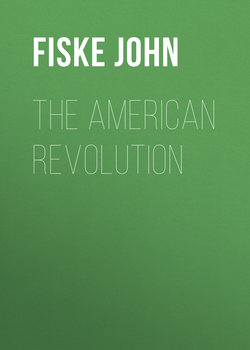The American Revolution

Реклама. ООО «ЛитРес», ИНН: 7719571260.
Оглавление
Fiske John. The American Revolution
VOLUME I
CHAPTER I. THE BEGINNINGS
CHAPTER II. THE CRISIS
CHAPTER III. THE CONTINENTAL CONGRESS
CHAPTER IV. INDEPENDENCE
CHAPTER V. FIRST BLOW AT THE CENTRE
CHAPTER VI. SECOND BLOW AT THE CENTRE
CHAPTER VII. SARATOGA
VOLUME II
CHAPTER VIII. THE FRENCH ALLIANCE
CHAPTER IX. VALLEY FORGE
CHAPTER X. MONMOUTH AND NEWPORT
CHAPTER XI. WAR ON THE FRONTIER
CHAPTER XII. WAR ON THE OCEAN
CHAPTER XIII. A YEAR OF DISASTERS
CHAPTER IV. BENEDICT ARNOLD
CHAPTER XV. YORKTOWN
Transcriptions
Отрывок из книги
During the seventy years which elapsed between the overthrow of the Stuart dynasty and the victory of Wolfe on the Heights of Abraham, the relations between the American colonies and the British government were, on the whole, peaceful; and the history of the colonies, except for the great and romantic struggle with New France, would have been almost destitute of striking incidents. In view of the perpetual menace from France, it was clearly unwise for the British government to irritate the colonies, or do anything to weaken their loyalty; and they were accordingly left very much to themselves. Still, they were not likely to be treated with any great liberality, – for such was not then, as it is hardly even yet, the way of governments, – and if their attachment to England still continued strong, it was in spite of the general demeanour of the mother-country.
In Massachusetts, for more than thirty years, there went on an unceasing controversy between the General Court and the successive royal governors, Shute, Burnet, and Belcher, with reference to the governor’s salary. The Lords of Trade insisted that the governor should be paid a fixed salary; but lest this should make the governor too independent, the General Court obstinately refused to establish a salary, but made grants to the governor from year to year, in imitation of the time-honoured usage of Parliament. This method was, no doubt, inconvenient for the governors; but the colonists rightly valued it as one of the safeguards of popular liberty, and to their persistent refusal the Crown was obliged to give way. Similar controversies, in New York and South Carolina, were attended with similar results; while in Virginia the assembly more than once refused to vote supplies, on the ground that the liberties of the colony were in danger.
.....
On Sunday, the 28th, the Dartmouth, first of the tea-ships, arrived in the harbour. The urgency of the business in hand overcame the sabbatarian scruples of the people.
The committee of correspondence met at once, and obtained from Francis Rotch, the owner of the vessel, a promise that the ship should not be entered before Tuesday. Samuel Adams then invited the committees of the five towns, to which Charlestown was now added, to hold a mass-meeting the next morning at Faneuil Hall. More than five thousand people assembled, but as the Cradle of Liberty could not hold so many, the meeting was adjourned to the Old South Meeting-House. It was voted, without a single dissenting voice, that the tea should be sent back to England in the ship which had brought it. Rotch was forbidden to enter the ship at the Custom House, and Captain Hall, the ship’s master, was notified that “it was at his peril if he suffered any of the tea brought by him to be landed.” A night-watch of twenty-five citizens was set to guard the vessel, and so the meeting adjourned till next day, when it was understood that the consignees would be ready to make some proposals in the matter. Next day, the message was brought from the consignees that it was out of their power to send back the tea; but if it should be landed, they declared themselves willing to store it, and not expose any of it for sale until word could be had from England. Before action could be taken upon this message, the sheriff of Suffolk county entered the church and read a proclamation from the governor, warning the people to disperse and “surcease all further unlawful proceedings at their utmost peril.” A storm of hisses was the only reply, and the business of the meeting went on. The proposal of the consignees was rejected, and Rotch and Hall, being present, were made to promise that the tea should go back to England in the Dartmouth, without being landed or paying duty. Resolutions were then passed, forbidding all owners or masters of ships to bring any tea from Great Britain to any part of Massachusetts, so long as the act imposing a duty on it remained unrepealed. Whoever should disregard this injunction would be treated as an enemy to his country, his ships would be prevented from landing – by force, if necessary – and his tea would be sent back to the place whence it came. It was further voted that the citizens of Boston and the other towns here assembled would see that these resolutions were carried into effect, “at the risk of their lives and property.” Notice of these resolutions was sent to the owners of the other ships, now daily expected. And, to crown all, a committee, of which Adams was chairman, was appointed to send a printed copy of these proceedings to New York and Philadelphia, to every seaport in Massachusetts, and to the British government.
.....